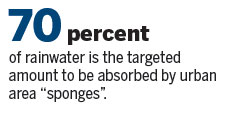Program will make cities 'sponges' for rainwater
Updated: 2015-10-10 08:41
By Xu Wei(China Daily)
|
||||||||
China's sponge city program will enable 80 percent of its urban areas to collect and recycle rainwater in the near future as the country rolls out a total investment of 86.5 billion yuan ($13.6 billion) over the next three years.
The sponge city campaign, which aims to turn urban areas into "sponges" to absorb and recycle 70 percent of rainwater, will cover 20 percent of China's urban areas by 2020 and 80 percent by 2030, Lu Kehua, vice-minister of housing and urban-rural development, said at a news conference on Friday.
"The campaign is to maximize our efforts to reduce the impact of urbanization on ecology and the environment," he said.
The central government has already selected 16 cities nationwide as a testing ground involving more than 450 square kilometers.
More than 130 cities nationwide have already formulated plans to push forward the sponge city campaign, he said.
The program will see the construction of high-level urban sewer systems during renovation work, and new roads, residences, industrial parks and public green areas, that enable the infiltration of water into the ground, as well as the recycling of stormwater.
However, funding issues remained one of the biggest challenges as it would require massive infrastructure investment.

Lu said the government will encourage more social capital to take part in the campaign.
"Companies will be allowed to issue their own bonds as part of the program, and the central government will also support the program with a special construction fund," he said.
Meanwhile, companies will be allowed to use expected earnings from the program for other investment purposes, he said.
The program was launched as a growing number of cities in China fall victim to summer floods as the stormwater runoff overwhelms urban drainage systems.
In 2012, urban flooding affected 184 cities, while in 2013 the number was 234 and last year it was 125, according to the State Flood Control and Drought Relief Headquarters.
More than 300 of China's 657 cities failed to reach national standards for flood prevention, and more than 90 percent of older urban areas don't even meet the lowest criteria for flood prevention, Zhang Jiatuan, a spokesman for the headquarters, said at a news conference in May.
"Because our cities have been filled with impervious surfaces, the infiltration of stormwater became impossible. ... Thus the program should focus primarily on the infiltration of water into the ground," he said.
xuwei@chinadaily.com.cn
- Air pollution dominates complaints to environmental ministry
- WHO calls for stricter curbs on tobacco promotion in China
- Pilot risks own life to save others after plane's engine fails
- Palace Museum's western part opens for first time in 90 years
- Suspect of fishing boat murder caught in E China
- 'Queen of Ivory' faces charge in Tanzania

 Chinese spending spree drives Japanese economy
Chinese spending spree drives Japanese economy
 Chasing time: Man amasses large watch collection
Chasing time: Man amasses large watch collection
 Palace Museum's western part opens for first time in 90 years
Palace Museum's western part opens for first time in 90 years
 Vivid sand sculptures attract visitors in Hunan
Vivid sand sculptures attract visitors in Hunan
 One killed in Northern Arizona University shooting
One killed in Northern Arizona University shooting
 Students join outdoor courses in countryside
Students join outdoor courses in countryside
 Stewardesses trained to show sweet smile
Stewardesses trained to show sweet smile
 Tourist attractions receive30 million visitors during Golden Week
Tourist attractions receive30 million visitors during Golden Week
Most Viewed
Editor's Picks

|

|

|

|

|

|
Today's Top News
Tu first Chinese to win Nobel Prize in Medicine
Huntsman says Sino-US relationship needs common goals
Xi pledges $2 billion to help developing countries
Young people from US look forward to Xi's state visit: Survey
US to accept more refugees than planned
Li calls on State-owned firms to tap more global markets
Apple's iOS App Store suffers first major attack
Japan enacts new security laws to overturn postwar pacifism
US Weekly

|

|








